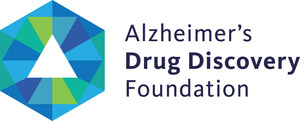The Alzheimer's Drug Discovery Foundation's Goodes Prize supports researchers transforming the field by translating the biology of aging into new therapeutics and diagnostic tools
NEW YORK, Sept. 20, 2023 /PRNewswire/ -- The Alzheimer's Drug Discovery Foundation (ADDF) has presented Rhoda Au, PhD, MBA, Professor of Anatomy and Neurobiology at the Boston University Chobanian and Avedisian School of Medicine, with the 2023 Melvin R. Goodes Prize for Excellence in Alzheimer's Drug Development for her pioneering work with digital biomarkers. The annual award honors prominent scientists who are recognized for their work transforming the Alzheimer's clinical trial space and was presented at the Ninth Annual Melvin R. Goodes Prize Luncheon.
"Dr. Au's research is a critical part of this pivotal moment in Alzheimer's research," says Howard Fillit, MD, Co-Founder and Chief Science Officer at the ADDF. "Now that we are beginning to see drugs emerge on the market, it is more important than ever to have corresponding biomarkers that can help us identify which patients will benefit from the right drugs at the right time."
Dr. Au's groundbreaking work, supported through the ADDF's Diagnostics Accelerator, leverages technology from smartphones and tablets to collect data on Alzheimer's-related characteristics, which can help to detect Alzheimer's 20 to 30 years before symptoms present, paving the way for early diagnosis and intervention. Her work is part of the Diagnostics Accelerator's larger strategy to fast-track the development of accessible and non-invasive tools to revolutionize Alzheimer's diagnosis and treatment. Dr. Au is the first researcher with work focused on diagnostic technologies to receive the Goodes Prize.
The data collected by Dr. Au and her team is used to create digital profiles that can differentiate between people with stable cognition, cognitive decline, and dementia. Digital biomarkers like those being developed by Dr. Au will make it easier and more accessible to monitor for warning signs of dementia, enabling patients to be monitored in their own homes rather than having to commute to a physician's office. These biomarkers combine cutting-edge technologies with the latest insights into the biology of aging.
The Goodes Prize, named for Melvin R. Goodes, a distinguished leader in the pharmaceutical industry, is awarded each year to an innovative researcher who has made a significant and lasting impact in the Alzheimer's field. The prize includes $150,000 to further the awardee's research.
"Dr. Au and all connected with the ADDF sustain our hope that Alzheimer's may be more than treatable. It may also be preventable—and dare we dream—curable," says Nancy Goodes. "With the innovative science we have heard about from Dr. Au and our past winners today, it is easy to imagine that the next big breakthrough comes right here, through the ADDF and the Goodes Prize."
"It is an incredible honor to accept this award and be inducted into a group of past recipients that includes some of the greatest minds in the Alzheimer's field," says Dr. Au. "I am grateful for the generosity of the Goodes family and for this endorsement from the ADDF of the promise of our work. We believe digital biomarkers can revolutionize the way we diagnose this disease and improve clinical trials to get effective drugs to the patients who need them as quickly as possible."
Notable guests in attendance included Joel Ehrenkranz, Bonnie Pfeifer Evans, Nancy Goodes, Leonard A. Lauder, Jo Carole and Ronald S. Lauder, Marsha and Henry Laufer, Hilary and Wilbur Ross, Randal Sandler, Sharon Sager, and Alice Shure.
"My brother and I founded the ADDF because we saw the urgent need for effective treatments for Alzheimer's, which touches families all across the globe," says Ronald S. Lauder, Co-Founder and Co-Chairman of the ADDF. "This is why it is so meaningful to be here to celebrate an award that honors the world's top Alzheimer's researchers, who along with the leadership of the ADDF are changing the course of this disease."
The event featured a thought-provoking discussion on how the biology of aging is leading to promising therapies in the drug pipeline with Dr. Howard Fillit and current and previous Goodes Prize recipients: Roberta Diaz Brinton, PhD, Inaugural Director of the Center for Innovation in Brain Science at the University of Arizona and member of the ADDF's Board of Governors; Daniel Martin Watterson, PhD, John G. Searle Professor of Molecular Biology and Biochemistry and Professor of Pharmacology at the Northwestern University Feinberg School of Medicine; Jerri M. Rook, PhD, Research Associate Professor in the Department of Pharmacology at Vanderbilt University in the Vanderbilt Center for Neuroscience Drug Discovery; Miranda E. Orr, PhD, Assistant Professor of Gerontology and Geriatric Medicine at the Wake Forest University School of Medicine; and Rhoda Au, PhD, MBA, Professor of Anatomy and Neurobiology at the Boston University Chobanian and Avedisian School of Medicine.
ABOUT THE ALZHEIMER'S DRUG DISCOVERY FOUNDATION (ADDF)
Founded in 1998 by Leonard A. and Ronald S. Lauder, the Alzheimer's Drug Discovery Foundation is dedicated to rapidly accelerating the discovery of drugs to prevent, treat and cure Alzheimer's disease. The ADDF is the only public charity solely focused on funding the development of drugs for Alzheimer's, employing a venture philanthropy model to support research in academia and the biotech industry. The ADDF's leadership and contributions to the field have played a pivotal role in bringing the first Alzheimer's PET scan (Amyvid®) and blood test (PrecivityAD®) to market, as well as fueling the current robust and diverse drug pipeline. Through the generosity of its donors, the ADDF has awarded more than $270 million to fund over 730 Alzheimer's drug discovery programs, biomarker programs and clinical trials in 19 countries. To learn more, please visit: http://www.alzdiscovery.org/.
SOURCE Alzheimer's Drug Discovery Foundation

WANT YOUR COMPANY'S NEWS FEATURED ON PRNEWSWIRE.COM?
Newsrooms &
Influencers
Digital Media
Outlets
Journalists
Opted In






Share this article